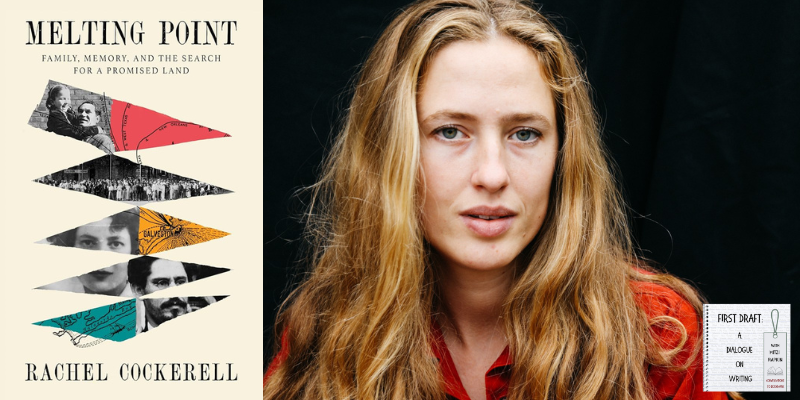First Draft: A Dialogue of Writing is a weekly show featuring in-depth interviews with fiction, nonfiction, essay writers, and poets, highlighting the voices of writers as they discuss their work, their craft, and the literary arts. Hosted by Mitzi Rapkin, First Draft celebrates creative writing and the individuals who are dedicated to bringing their carefully chosen words to print as well as the impact writers have on the world we live in.
Article continues after advertisement
In this episode, Mitzi talks to Rachel Cockerell about her new non-fiction book, Melting Point.
Subscribe and download the episode, wherever you get your podcasts!
From the episode:
Mitzi Rapkin: You write in your preface – which is really helpful and makes the book a little bit richer – about how this started off as a very traditional narrative, and you realized, when you took everything apart, that your voice had these three categories. It was either that you were paraphrasing someone else, you were giving a description, or you were making an observation, and they all seemed useless, so you eventually took all that out. You quote an interview with George Saunders that helped you along the way. You ended up with a book more like a documentary where all the voices speak for themselves. And I’m wondering if you can talk about this realization, and if there was any sort of loss you felt. Sometimes we get so attached to things, we have to go through something to let them go, to come to the other side.
Rachel Cockerell: I guess I should explain that this book is told entirely through interwoven primary sources, which sounds a bit a bit grand and also a bit vague and a bit sort of highfalutin, but what it means is that it’s just quotations and snippets and eyewitness accounts like all nonfiction books, but without my voice in there, sort of gluing them together, or being a sort of character. I find when I’m reading history books, especially, usually the best bits are the quotations where you just feel that sense of immediacy, you feel like you’re there. And I began to wonder whether I could just weave this story only through the eyes of those who were there, and George Saunders’s book, Lincoln in the Bardo kind of gave me permission. His book is partly real primary sources and partly made-up primary sources, and also partly just ghosts that George Saunders has made up. I heard this interview where he said he wondered whether he was sort of allowed to make a book in such a strange form. And you know, a voice said back to him, it’s your book. Do what you want. And that was something I had to sort of repeat to myself over and over again when I was making all these rules for this book. I said to myself, you know, you can do what you want. We have such strict ideas about genre and fiction and nonfiction and history, and it was fun to be a bit playful with that and see how far outside that framework of genre I could be. So, I began to take my own voice out. My first draft was a more conventionally written book. And then as I took my own voice out, I felt all these sort of bristles of energy as these sources bumped up against each other and seemed to almost be in conversation, as if these voices from 100 or more years ago were, were interacting with each other in some way. I guess I didn’t really feel a sense of loss. It was quite a thrill to take my voice out after so long of reading back over this draft and being frustrated by the inanity of my own voice in this story. You know this book starts more or less with the first Zionist Congress, and I was not there for that. I kind of felt like I was interjecting, like I was pulling the reader back into the 21st Century. And it was a real joy to finally find the sort of solution to that problem that I had felt was in the book.
***
Rachel Cockerell was born and raised in London, the sixth of seven children. Melting Point is her first nonfiction book. Her research has taken her to Texas, Ohio, New York, Tel Aviv, and Jerusalem.
